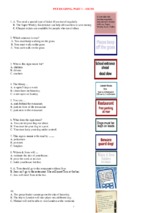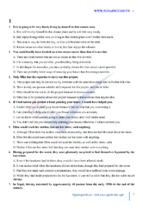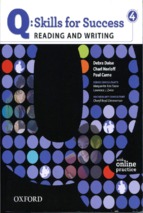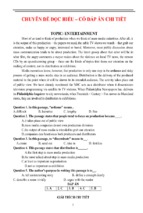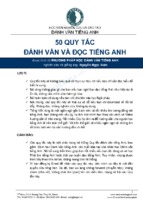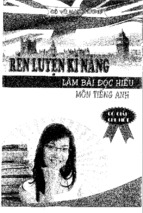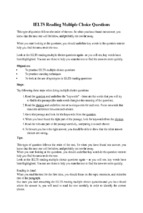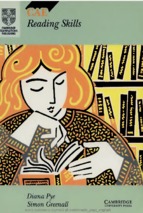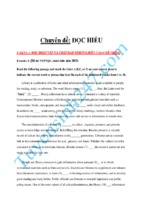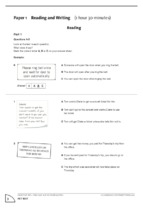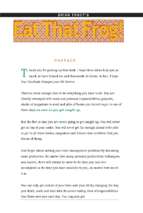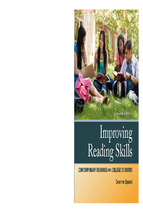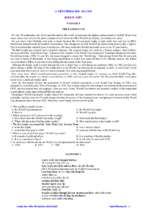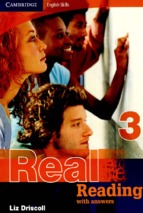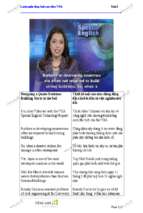D U B L I N PEOPLE
Stage 6
Do you ever stare at strangers on a bus or a train, and
wonder who they are and what they're like? A girl, going
home from her job to an empty bedsitter, perhaps. She
looks shy, unsure of herself, probably doesn't find it easy to
make friends . . .
Or a middle-aged man, with a cheerful sort of face — the
kind of man who likes to have a drink and a joke in the pub
with his friends. But now he looks irritable, depressed,
maybe even a little guilty . . .
Here, in short stories full of compassion and humour,
Maeve Binchy takes us into the lives of two such people.
Irish people, living in Dublin, but we would recognize them
anywhere. Jo, newly come to the big city . . . and Gerry, a
man with a problem. We share their anxieties and hopes,
their foolishness, even their tragedy . . .
Maeve Binchy (1940-) was born in County Dublin, Ireland.
She is a journalist and a well-known author of several
bestsellers, which include novels, such as Firefly Summer
and The Copper Beech, and volumes of short stories. The
two stories retold in this book are from her collection
entitled Dublin 4.
OXFORD BOOKWORMS
Series Editor: Tricia Hedge
DUBLIN PEOPLE
Maeve Binchy
retold by
Jennifer Bassett
O X F O R D U N I V E R S I T Y PRESS
Oxford University Press
Great Clarendon Street, Oxford OX2 6DP
CONTENTS
Oxford New York
Athens Auckland Bangkok Bogota Bombay
Buenos Aires Calcutta Cape Town Dar es Salaam Delhi
Florence Hong Kong Istanbul Karachi Kuala Lumpur
Madras Madrid Melbourne Mexico City Nairobi
Paris Singapore Taipei Tokyo Toronto Warsaw
and associated companies in
Berlin Ibadan
OXFORD and OXFORD ENGLISH
are trade marks of Oxford University Press
ISBN 0 19 422705 7
Original edition © Maeve Binchy 1982
First published by Ward River Press Ltd, Eire 1982
This simplified edition © Oxford University Press 1993
Flat in Ringsend
Murmurs in Montrose
First published 1993
Fifth impression 1997
The moral right of the Author has been asserted
No unauthorized photocopying
All rights reserved. No part of this publication may
be reproduced, stored in a retrieval system, or transmitted,
in any form or by any means, electronic, mechanical,
photocopying, recording, or otherwise, without the prior
written permission of Oxford University Press.
This book is sold subject to the condition that it shall not,
by way of trade or otherwise, be lent, resold, hired out, or
otherwise circulated without the publisher's prior consent
in any form of binding or cover other than that in which it is
published and without a similar condition including this
condition being imposed on the subsequent purchaser.
Illustrated by Susan Sluglett
Please note that the two stories in this volume
appeared in their original form in the collection
of short stories by Maeve Binchy entitled Dublin 4.
Printed in England by Clays Ltd, St Ives pic
Exercises
102
Glossary
105
1
45
FLAT IN RINGSEND
*
Jo knew what she should do. She should get the evening papers
at lunch-time, read all the advertisements for flats, and as soon
as she saw one that looked suitable, she should rush round at
once and sit on the doorstep. Never mind if the advertisement
said 'After six o'clock'. She knew that if she went at six o'clock,
and the flat was a good one, she'd probably find a queue of
people all down the street. Finding a good flat in Dublin, at a
rent you could afford, was like finding gold in the gold rush.
The other way was by personal contact. If you knew
someone who knew someone who was leaving a flat . . . That
was often a good way. But for somebody who had only just
arrived in Dublin, there was no chance of any personal contact.
No, it was a matter of staying in a hostel and searching.
Jo had been to Dublin several times when she was a child.
She had been on school excursions, and to visit Dad that time he
had been in hospital and everyone had been crying in case he
wouldn't get better. Most of her friends, though, had been up to
Dublin much more often. They talked in a familiar way about
places they had gone to, and they assumed that Jo knew what
they were talking about.
'You must know the Dandelion Market. Let me see, you
1
Dublin People
Flat in Ringsend
come out of the Zhivago and you go in a straight line to your
right, keep going and you pass O'Donoghues and the whole of
Stephen's Green, and you don't turn right down Grafton Street.
Now do you know where it is?'
After such a long, helpful explanation, Jo said that she did
know. Jo was always anxious to please other people, and she
felt that she only annoyed them by not knowing what they were
talking about. But really she knew hardly anything about
Dublin. She felt that she was stepping into an unknown world
when she got on the train to go and work there. She hadn't
asked herself why she was going. Everyone had assumed that
she would go. Who would stay in a one-horse town, the end of
the world, this dead-and-alive place? At school all the girls were
going to get out, escape, do some real living. Some of Jo's class
had gone as far as Ennis or Limerick, often to stay with cousins.
A few had gone to England, where an older sister or an aunt
would help them to start a new life. But only Jo was going to
Dublin, and she had no relations there. She was going off on
her own.
There had been a lot of jokes about her going to work in
the Post Office. There'd be no trouble in getting a stamp to
write a letter home; what's more, there'd be no excuse if she
didn't. She could make the occasional secret free phone call,
too . . . which would be fine, except that her family didn't have
a phone at home. Maybe she could send a ten-page telegram if
she needed to say anything in a hurry. People assumed that she
would soon know everything about people's private business in
Dublin, in the same way as Miss Hayes knew everyone's
business from the post office at home. They said that she'd find
it very easy to get to know people. There was nowhere like a
post office for making friends; it was the centre of everything.
Jo knew that she would be working in a small local post
office, but her dreams of life in Dublin had been about the big
General Post Office in the centre. She had imagined herself
working there, chatting up all the customers as they came in,
and knowing every single person who came to buy stamps or
collect the children's allowances. She had dreamt of living
somewhere nearby, in the heart of the city, maybe on the corner
of O'Connell Bridge, so that she could look at the Liffey river
from her bedroom.
She had never expected the miles and miles of streets where
nobody knew anyone, the endless bus journeys, and setting off
for work very early in the morning in case she got lost or the bus
was cancelled.
'Not much time for a social life,' she wrote home. 'I'm so
exhausted when I get back to the hostel that I just go to bed and
fall asleep.'
Jo's mother thought it would be great if Jo stayed permanently
in the girls' hostel. It was run by nuns, and Jo could come to no
harm there. Her father said that he hoped they kept the place
warm; nuns were famous for freezing everyone else to death just
because they themselves wore very warm underclothes. Jo's
sisters, who worked in the local hotel as waitresses, said Jo must
be mad to have stayed a whole week in a hostel. Her brother
who worked in the market said he was sorry she didn't have a
flat; it would be somewhere to stay whenever he went to
Dublin. Her brother who worked in the garage said that Jo
should have stayed at home. What was the point of going to live
in Dublin? Jo would only get discontented and become like that
O'Hara girl, happy neither in Dublin nor at home. However,
2
3
Dublin People
Flat in Ringsend
everybody knew that he had been keen on the O'Hara girl for a
long time, and was very annoyed that she wouldn't stay quietly
in her home town and be like a normal woman.
But Jo didn't know that they were all thinking about her and
discussing her, as she answered the advertisement for the flat in
Ringsend. It said, Own room, own television, share kitchen,
bathroom. It was very near her post office and seemed too good
to be true. Please, God, please. I hope it's nice, I hope they like
me, I hope it's not too expensive.
There wasn't a queue for this one because it wasn't really a
flat to rent; the advertisement had said, Third girl wanted. Jo
wondered if 'own television' meant that the place was too
expensive or too high-class for her, but the house did not look
very frightening. It was in a row of ordinary, red-brick houses
with basements. Her father had warned her against basements;
they were full of damp, he said, but then her father had a bad
chest and saw damp everywhere. But the flat was not in the
basement, it was upstairs. And a cheerful-looking girl wearing
a university scarf, obviously a failed applicant, was coming
down the stairs.
'Dreadful place,' she said to Jo. 'The girls are both awful. As
common as dirt.'
'Oh,' said Jo and went on climbing.
'Hallo,' said the girl with 'Nessa' printed on her T-shirt.
'God, did you see that awful upper-class cow going out? I just
can't put up with that kind of girl, I really hate them . . .'
'What did she do?' asked Jo.
'Do? She didn't have to do anything. She just looked around
and wrinkled her lip and gave a rude little laugh, and then said,
"Is this it? Oh dear, oh dear," in her silly upper-class accent.
Stupid old cow. We wouldn't have had her in here even if we
were starving and needed her rent to buy a piece of bread . . .
would we, Pauline?'
Pauline was wearing a shirt of such blindingly bright colours
that it hurt the eyes to look at it. But the colour of her hair was
almost as bright as her shirt. Pauline was a punk, Jo noted with
amazement. She had seen punks on O'Connell Street, but she
had never talked to one.
'No, stupid old bore,' said Pauline. 'That girl was such a
bore. She'd have bored us to death. Years later our bodies
would have been found here and the judge would have said that
it was death by boredom . . .'
Jo laughed. It was such a wild thought to think of all that
pink hair, lying dead on the floor, because it had been bored to
death by an upper-class accent.
'I'm Jo,' she began, 'I work in the post office and I rang . . .'
Nessa said they were just about to have a mug of tea. She
brought out three mugs; one had 'Nessa', one had 'Pauline', and
the last one had 'Other' written on it. 'We'll get your name put
on if you come to stay,' Nessa said generously.
Both girls had office jobs nearby. They had got the flat three
months ago and Nessa's sister had had the third room, but now
she was getting married very quickly, very quickly indeed, and
so the room was empty. They explained the cost, they showed
Jo the hot-water heater in the bathroom, and they showed her
the cupboard in the kitchen, each shelf with a name on it Nessa, Pauline, and Maura.
'Maura's name will go, and we'll paint in yours if you come
to stay,' Nessa said again, in a friendly way.
'You've no sitting room,' Jo said.
4
5
Dublin People
Flat in Ringsend
'No, we made the flat into three bedsitters,' said Nessa.
'Makes much more sense,' said Pauline.
'What's the point of a sitting room?' asked Nessa.
'I mean, who's going to sit in it?' asked Pauline.
'And we've got two chairs in our own rooms,' Nessa said
proudly.
'And each of us has our own television,' said Pauline happily.
That was the point that Jo wanted to discuss.
'Yes, you didn't say how much that costs. Do I have to pay
rent for the TV?'
There was a wide smile on Nessa's big happy face. 'Not a
penny. You see, Maura's boyfriend, Steve, well, her husband
now, I hope; anyway, Steve worked in the business and he was
able to get us TVs for almost nothing.'
'So you bought them — you don't rent them at all?' Jo was
delighted.
'Well, b o u g h t . . . in a manner of speaking,' Pauline said. 'We
certainly accepted them.'
'Yeah, it was Steve's way of saying thank you, his way of
paying the r e n t . . . in a manner of speaking,' Nessa said.
'But did he stay here too?'
'He was Maura's boyfriend. He stayed most of the time.'
'Oh,' said Jo. There was a silence.
'Well?' Nessa said accusingly. 'If you've got anything to say,
you should say it now.'
'I suppose I was wondering . . . didn't he get in everyone's
way? I mean, if a fourth person was staying in the flat, was it fair
on the others?'
'Why do you think we organized the flat into bedsits?'
Pauline asked. 'It means we can all do what we like, when we
like, without getting in each other's way. Right?'
'Right,' Nessa said.
'Right,' Jo said, doubtfully.
'So what do you think?' Nessa asked Pauline. 'I think Jo
would be OK if she wants to come, don't you?'
'Yeah, sure, I think she'd be fine if she'd like it here,' said
Pauline.
'Thank you,' said Jo, her face going a little pink.
'Is there anything else you'd like to ask? I think we've told
you everything. There's a phone with a coin-box in the hall
downstairs. There are three nurses in the flat below us, but they
don't take any messages for us so we don't take any for them.
The rent has to be paid on the first of the month, plus five
pounds each, and I buy a few basics for the flat.'
'Will you come, then?' asked Nessa.
'Please. I'd like to very much. Can I come on Sunday night?'
They gave her a key, took her rent money, poured another
mug of tea, and said that it was great to have fixed it all up so
quickly. Nessa said that Jo was such a short name it would be
really easy to paint it onto the shelf in the kitchen, the shelf in
the bathroom and her mug.
'She wanted to paint the names on the doors too, but I
wouldn't let her,' said Pauline.
'Pauline thought it would look too much like a children's
nursery,' said Nessa regretfully.
'That's right,' laughed Pauline. 'I wanted to leave a bit of
variety in life. If our names are on the doors, then we'll never get
any surprise visitors during the night — and I always like a bit of
the unexpected!'
Jo laughed too. She hoped they were joking.
6
7
Dublin People
Flat in Kingsend
It was tea-time in the hostel on Sunday when Jo said goodbye.
She struggled with her two suitcases to the bus stop.
'Your friends aren't going to collect you?' asked Sister Mary,
one of the nuns.
'They haven't a car, Sister.'
'I see. Often, though, young people come to help a friend. I
hope they are kind people, your friends.'
'Very kind, Sister.'
'That's good. Well, God be with you, child, and remember
that this is a very wicked city. There's a lot of very wicked
people in it.'
'Yes, Sister. I'll keep my eyes open for them.'
It took her a long time to get to the flat.
She had to change buses twice, and was nearly exhausted
when she got there. She struggled up the stairs with her cases
and into her new room. It was smaller than it had looked on
Friday, but it could hardly have shrunk. On the bed were two
blankets and two pillows, but no sheets. Oh God, she'd
forgotten about sheets. And of course, there was no towel
either. She'd assumed that they would be included. How stupid
of her not to have asked.
She hoped the girls wouldn't notice, and that she'd be able to
go out in her lunch hour tomorrow and buy some. At least she
had her savings to use for just this kind of emergency.
She put away all her clothes in the narrow little cupboard,
and put out her ornaments on the window sill and her shoes in
a neat line on the floor. She put her suitcases under the bed and
sat down, feeling very dull.
Back in her home town her friends would be going out to the
cinema or to a Sunday night dance. In the hostel some of the
girls would be watching television in the sitting room, others
would have gone to the cinema together. Then they would buy
fish and chips to eat on the way home, throwing the papers into
the rubbish bin on the corner of the street because Sister didn't
like the smell of chips coming into the building.
Not one of them was sitting alone on a bed with nothing to do.
She could go out and take the bus into the centre and go to the
cinema alone. But that seemed silly when she had her own
television. Her very own. She could change to different programme
whenever she wanted to; she wouldn't have to ask anyone.
She was about to go to the sitting room to look for a Sunday
newspaper, when she remembered there was no sitting room.
She didn't want to open the doors of their rooms in case they
came in and found her looking. She wondered where they were.
Was Nessa out with a boyfriend? She hadn't mentioned one, but
then girls in Dublin didn't tell you immediately if they had a
boyfriend or not. Perhaps Pauline was at a punk disco. Jo
couldn't believe that anyone would actually employ Pauline
8
9
Jo wrote to her mother and told her that the flat was in a very
nice district. She told her father how far it was from the damp
basement, and she mentioned the television in each bedroom in
order to make her sisters jealous. They had said she was stupid
to go to Dublin; the best Dublin people all came to County
Clare on their holidays. Why didn't she stay at home and meet
them there, rather than going to the city and trying to find them
in their own place?
Dublin People
with that bright pink hair and let her meet the public, but maybe
she was kept hidden in a back office. Surely the girls would be
home by about eleven o'clock? Perhaps then they could all have
a cup of hot chocolate together in the sitting room - well, in the
kitchen, to end the day. Meanwhile, she would sit back and
watch her very own television.
Jo fell asleep after half an hour. She had been very tired. She
dreamed that Nessa and Pauline had come in. Pauline had
decided to wash the pink out of her hair and share a room with
Nessa. They were going to turn Pauline's room into a sitting
room where they would sit and talk and plan. She woke up
suddenly when she heard laughter. It was Pauline and a man's
voice, and they had gone into the kitchen.
Jo shook herself. She must have been asleep for three hours;
she had a stiff neck and the television was still going. She stood
up and turned it off, combed her hair and was about to go out
and welcome the homecomers when she hesitated. If Pauline
had invited a boy home, perhaps she was going to take him to
bed with her. Perhaps she wouldn't want her new flatmate
coming out to join in the conversation. They were laughing in
the kitchen, she could hear them, then she heard the kettle
whistling. Ah, she could always pretend that she just wanted to
make herself a cup of tea.
Nervously, she opened the door and went into the kitchen.
Pauline was with a young man who wore a heavy leather jacket
with a lot of bits of metal on it.
'Hallo, Pauline, I was just going to get myself a cup of tea,' Jo
said apologetically.
'Sure,' Pauline said. She was not unfriendly, she didn't look
annoyed, but she made no effort to introduce her friend.
10
Flat in Ringsend
Nervously, she opened the door and went into the kitchen.
11
Dublin People
Flat in Ringsend
The kettle was still hot so Jo found a mug with 'Visitor' on
it and put in a tea bag.
'Nessa's going to paint my name on a mug,' she said to the
man in the jacket, just for something to say.
'Oh, good,' he said. He looked at Pauline and asked, 'Who's
Nessa?'
'Lives over there,' Pauline said, pointing in the direction of
Nessa's room.
'I'm the third girl,' Jo said desperately.
'Third in what?' the man said, puzzled.
Pauline had finished making her tea and was moving towards
the door, carrying two mugs.
'Goodnight,' she said cheerfully.
'Goodnight, Pauline, goodnight . . . er . . .' Jo said.
She took her mug of tea into her own room and turned on her
television again. She turned it up quite loud in case she heard the
sound of anything next door. She hoped she hadn't annoyed
Pauline. She didn't think she had done anything to annoy her,
and anyway Pauline had seemed cheerful enough when she was
taking this boy off to - well, to her own room. Jo sighed and got
into bed.
'Right.' Nessa was already on her way out.
'What time are you coming home tonight?' Jo asked.
'Oh, I don't think I'll have done your name by tonight,'
Nessa said.
'I didn't mean that. I just wondered what you were doing for
your tea . . . supper. You know?'
'No idea,' said Nessa cheerfully.
'Oh,' said Jo. 'Sorry.'
*
*
*
Next morning she was coming out of the bathroom when she
met Nessa.
'Jo is just two letters, "J" and "O", isn't it?' Nessa asked.
'Oh yes, that's right, thank you very much, Nessa.'
'Right. I didn't want to paint your name and then find you
had an "E" on it.'
'No, no, it's short for Josephine.'
12
Jacinta, who worked beside Jo in the post office, asked her how
the flat was.
'It's great,' Jo said.
'You were right to get out of that hostel. You can't live your
own life in a hostel,' Jacinta said wisely.
'No, no indeed.'
'God, 1 wish I didn't live at home,' Jacinta said. 'It's not
natural for people to live with their own parents. There should
be a law about it. There are laws about stupid things like not
bringing living chickens into the country — who would want to
do that anyway? - But there are no laws about the things that
people really need.'
'Yes,' said Jo dutifully.
'Anyway, you'll be having a great time from now on.
Country girls like you have all the luck.'
'I suppose we do,' Jo agreed doubtfully.
Jo bought a hamburger on the way home and ate it. She washed
some underclothes, she put the new sheets on the bed and hung
13
Dublin People
Flat in Ringsend
her new towel up in the bathroom. She took out her writing
paper but remembered that she had written home on Friday just
after she had found the flat. There was nothing new to tell.
If she had stayed in the hostel, they might have been playing
a game of cards in the sitting room now. Or someone might
have bought a new record. The girls would be looking at the
evening paper, sighing over the price of flats, wondering
whether to go to the cinema. There would be talk, and endless
cups of tea or bottles of Coke from the machine. There would
not be four walls as there were now.
The evening stretched emptily ahead of her. And then there
would be Tuesday and Wednesday and Thursday . . . Tears
came into her eyes and ran down her face as she sat on the end
of her bed. She must be a really horrible person, she thought, to
have no friends and nowhere to go and nothing to do. Other
people of eighteen had a great time. She used to have a great
time when she was seventeen, at school and planning to be
eighteen. Look at her now, sitting alone. Even her flatmates
didn't want to have anything to do with her. Jo cried and cried.
Then she got a headache so she took two headache pills and
climbed into bed. It's bloody fantastic being grown up, she
thought, as she switched off the light at nine o'clock.
There was a 'J' on the place where her towel hung, her name
was on the bathroom shelf that belonged to her, and her empty
kitchen shelf had a 'Jo' on it also. She examined the other two
shelves. Nessa had breakfast cereal and a packet of sugar and a
lot of tins of soup on her shelf. Pauline had a biscuit tin and
several tins of grapefruit on hers.
The kitchen was nice and tidy. Nessa had said the first day
that they never left any washing up to be done and that if you
used the frying pan, you had to clean it then, not leave it in the
sink until the morning. It had all seemed great fun when she was
talking about it then, because Jo had imagined midnight
suppers, and all three of them laughing and having parties.
That's what people did, for heaven's sake. She must have come
to live with two really unsociable people, that was her problem.
Pauline came in to the kitchen yawning, and opened a tin of
grapefruit.
'I think I'd never wake up if I didn't have this,' she said. 'I
have half a tin of grapefruit and two biscuits for my breakfast
every day, then I'm ready for anything.'
Jo was pleased to be spoken to.
'Is your friend here?' she said, trying to sound modern and up
to date.
'Which friend?' Pauline yawned and began to spoon the
grapefruit out of the tin into a bowl.
'You know, your friend, the other night?'
'Nessa?' Pauline looked at her, not understanding. 'Do you
mean Nessa?'
'No, the fellow, the man with the leather jacket with the
metal bits. I met him here in the kitchen.'
'Oh yes. Shane.'
'Shane. That was his name.'
'Yeah, what about him, what were you saying?'
'I was asking if he was here.'
'Here? Now? Why should he be here?' Pauline pushed her
pink hair out of her eyes and looked at her watch. 'Jesus Christ,
it's only twenty to eight in the morning. Why would he be here?'
14
15
Dublin People
Flat in Ringsend
She looked wildly around the kitchen as if the man with the
leather jacket was going to appear from behind the gas cooker.
Jo felt the conversation was going wrong.
'I just asked sociably if he was still here, that was all.'
'But why on earth would he be still here? I went out with him
on Sunday night. Sunday. It's Tuesday morning now, isn't it?
Why would he be here?' Pauline looked confused and worried,
and Jo wished she had never spoken.
'I just thought he was your boyfriend . . .'
'No, he's not, but if he was, I tell you I wouldn't have him
here at twenty to eight in the morning talking! I don't know
how anyone can talk in the mornings. I just don't understand it.'
Jo drank her tea silently.
'See you,' said Pauline eventually when she had finished her
grapefruit and biscuits, and crashed into the bathroom.
Jo thanked Nessa for putting up the names. Nessa was
pleased.
'I like doing that. It gives me a sense of order in the world. It
gives everything a place in the system, and that makes me feel
better.'
'Sure,' said Jo. She was just about to ask Nessa what she
was doing that evening when she remembered the lack of interest
that Nessa had shown yesterday. She decided to express it
differently this time.
'Are you off out with your friends this evening?' she said
cautiously.
'I might be, I might not, it's always hard to know in the
morning, isn't it?'
'Yes, it is,' said Jo untruthfully. It was becoming increasingly
easy to know in the morning, she thought. The answer was
coming up loud and clear when she asked herself what she was
going to do in the evening. The answer was Nothing.
'Well, I'm off now. Goodbye,' she said to Nessa.
Nessa looked up and smiled. 'Bye bye,' she said absentmindedly, as if Jo had been the postman or the man delivering
milk on the street.
16
17
*
*
*
On Thursday night Jo went downstairs to answer the phone. It
was for one of the nurses on the ground floor as it always was.
She knocked quietly on their door. The big fair-haired nurse
thanked her, and as Jo was going up the stairs again she heard
the girl say, 'No, it was one of the people in the flats upstairs.
There's three flats upstairs and we all share the same phone.'
That was it. That was what she hadn't realized. She wasn't in
a flat with two other girls; she was in a flat by herself. Why
hadn't she understood that? She was in a proper bedsitter all of
her own; she just shared the kitchen and bathroom.
That's what had been wrong. She had thought that she was
meant to be part of a friendly all-girls-together flat. That's why
she had been so miserable. She thought back through the whole
conversation with Nessa on the first day. She remembered what
they had said about turning the flat into bedsitters but not
telling the landlord anything - it was never a good idea to tell
landlords anything, just keep paying the rent and keep out of his
way.
There was quite a cheerful smile on her face now. I'm on my
own in Dublin, she thought, I have my own place, I'm going out
to find a life for myself now. She didn't have to worry about
Pauline's behaviour any more now. If Pauline wanted to bring
Dublin People
Flat in Ringsend
home a rough-looking person with metal bits on his jacket, that
was Pauline's business. She just lived in the flat next door.
That's what Pauline had meant when she had said Nessa lived
next door. And that's why Nessa was so keen on all this
labelling and naming things. No wonder they had been slightly
surprised when she kept asking them what they were doing in
the evening. They must have thought she was mad.
Happy for the first time since Sunday, Jo got herself ready for
a night out. She put on eyeshadow and mascara, she put some
colour on her cheeks and wore her big earrings. She didn't know
where she was going, but she decided that she would go out
cheerfully now. She looked around her room and liked it much
better. She would get some pictures for the walls, she would
even ask her mother if she could take some of the ornaments
from home. The kitchen shelves at home were packed full with
ornaments; her mother would be glad to give some of them a
new home. Singing happily to herself, she set off.
She felt really great as she walked purposefully along the
street. She pitied her sisters who were only now finishing their
evening's work at the hotel. She pitied the girls who still had to
stay in a hostel, who hadn't been able to go out and find a place
of their own. She felt sorry for Jacinta who had to stay at home
and whose mother and father questioned her about where she
went and what she did. She pitied people who had to share
televisions. What if you wanted to watch one programme and
they wanted to watch something else? How did you decide? She
was so full of cheerful thoughts that she nearly walked past the
pub where the notice said: Tonight-the Great Gaels.
Imagine, the Great Gaels were there in person. In a pub.
Entrance charge £1. If she paid a pound, she would see them
close to. Up to now she had only seen them on television.
They had been at her local town once about four years ago,
before they were famous. She remembered seeing an
advertisement, saying that they would be in this pub tonight,
and now here she was outside it.
Jo's heart beat fast. Was it a thing you could do on your own,
go into a concert in a pub? Probably it was a thing that people
went to in groups; she might look odd. Maybe there'd be no
place for just one person to sit. Maybe it would only be tables
for groups.
But then a great wave of courage came flooding over her. She
was a young woman who lived in a flat on her own in Dublin,
she had her own place and by the Lord, if she could do that, she
could certainly go into a pub and hear the Great Gaels on her
own. She pushed the door.
A man sat at the desk inside and gave her a ticket and took
her pound.
'Where do I go?' she almost whispered.
'For what?' he asked.
'You know, where exactly do I go?' she asked. It seemed like
an ordinary pub to her. There was no stage. Maybe the Great
Gaels were upstairs.
The man assumed that she was looking for the toilet. 'I think
the Ladies is over there near the other door, yes, there it is,
beside the Gents.' He pointed across the room.
Her face turning a dark red, she thanked him. In case he was
still looking at her, she thought she had better go to the Ladies.
Inside, she looked at her face in the mirror. It had looked fine at
home, back in her flat. In here it looked a bit dull, no character,
no colour. The light wasn't very bright but she put on a lot more
18
19
Dublin People
Flat in Ringsend
make-up, and then came out to find out where the concert
would be held.
She saw two women sitting together. They looked safe
enough to ask. They told her with a look of surprise that the
concert would be in the pub, but not for about an hour.
'What do we do until then?' she asked.
They laughed. 'I suppose you could consider having a drink.
It is a pub, after all,' said one of them. They went back to their
conversation.
Jo felt very silly. She didn't want to leave and come back in
case she had to buy another ticket to get in again. She wished she
had brought a newspaper or a book. Everyone else seemed to be
talking.
She sat for what seemed like a very long time. Twice the
waiter asked her if she would like another drink as he cleaned
the table around her glass of orange juice, which she was trying
to make last a long time. She didn't want to waste too much
money; a pound already for coming in was enough to spend.
Then people arrived and started to fix up microphones, and
the crowd was bigger suddenly and she had to sit squashed up
at the end of the seat. Then she saw the Great Gaels having pints
of beer at the bar just as if they were ordinary customers.
Wasn't Dublin fantastic? You could go into a pub and sit and
have a drink in the same place as the Great Gaels. They'd never
believe her at home.
The lead singer of the Great Gaels was tapping the
microphone and testing it by saying, 'a-one, a-two, a-three . . .'
Everyone laughed and made themselves comfortable with full
drinks.
'Come on now, attention please, we don't want anyone with
an empty glass now getting up and disturbing us,' the lead
singer said.
'No need to worry about that,' someone shouted.
'All right, look around you. If you see anyone who might get
thirsty, fill up their glass for them.'
Two men beside Jo looked at her glass disapprovingly.
'What have you in there, Miss?' one said.
'Orange, but it's fine, I won't get up and disturb them,' she
said, hating to be the centre of attention.
'Large gin and orange for the lady,' one man said.
'Oh no,' called Jo, 'it's not gin . . .'
'Sorry. Large vodka and orange for the lady,' he corrected.
'Right,' said the waiter, looking at her with disapproval, Jo
thought.
When it came, she had her purse out.
'Nonsense, I bought you a drink,' said the man.
'Oh, but you can't do that,' she said.
He paid what seemed like a fortune for it; Jo looked into the
glass nervously.
'It was very expensive, wasn't it?' she said.
'Well, we can't always be lucky. You might have been a beer
drinker,' he smiled at her. He was very old, over thirty, and his
friend was about the same.
Jo wished they hadn't bought the drink. She wasn't used to
accepting drinks. Should she offer to buy the next lot of drinks
for them all? Would they accept, or, worse still, would they buy
her another? Perhaps she should just accept this one and move
a bit away from them. But wasn't that awfully rude? Anyway,
now with the Great Gaels about to begin, she wouldn't have to
talk to them.
20
21
Dublin People
Flat in Ringsend
'Thank you very much indeed,' she said, putting the orange
into the large vodka. 'That's very nice of you, and most
generous.'
'Not at all,' said the man with the open-neck shirt.
'It'sh a pleashure,' said the other man.
He was having difficulty saying the letter V properly, and Jo
realized that both the men were very drunk.
The Great Gaels had started, but Jo couldn't enjoy them. She
felt this should have been a great night, only twenty feet away
from Ireland's most popular singers, in a nice, warm pub, and a
free drink in her hand. What more could a girl want? But to her
great embarrassment the man with the open-neck shirt had
positioned himself so that his arm was along the back of the seat
behind her, and from time to time it would drop round her
shoulder. His friend was beating his feet to the music with such
energy that a lot of his beer had already spilled on the floor.
Jo hoped desperately that they wouldn't start behaving
wildly, and that if they did, nobody would think that they were
with her. She had a horror of drunks ever since the time when
her family had been invited to Uncle Jim's for a meal. Uncle Jim
had picked up the meat from the table and thrown it into the fire
because someone had tried to argue with him. The evening had
been a complete disaster and as they went home, her father had
spoken about drink being a good servant but a cruel master.
Her father had said that Uncle Jim was two people, one drunk
and one sober, and they were as unlike as you could find. Her
father said he was thankful that Uncle Jim's weakness hadn't
been noticeable in any of the rest of the family, and her mother
had been very upset and said they had all thought Jim was
cured.
Sometimes her sisters told her terrible things people had
done in the hotel when they were drunk. Drunkenness was
something frightening and unknown. And now she had managed
to find herself in a corner with a drunk's arm around her.
The Great Gaels played song after song, and they only
stopped at the pub's closing time. Jo had now received another
large vodka and orange from the friend of the open-shirted
man, and when she had tried to refuse, he had said, 'You took
one from Gerry - what's wrong with my drink?'
She had been so alarmed by his attitude that she had rushed
to drink it.
The Great Gaels were selling copies of their latest record, and
signing their names on it as well. She would have loved to have
bought it in some ways, to remind herself that she had been right
beside them, but then it would have reminded her of Gerry and
Christy, and the huge vodkas which were making her legs feel
peculiar, and the awful fact that the evening was not over yet.
'I tried to buy you a drink to say thank you for all you bought
me, but the barman told me it's after closing time,' she said
nervously.
'Is it now?' said Gerry. 'Isn't that a bit of bad news.'
'Imagine, the girl didn't get a chance to buy us a drink,' said
Christy.
'That's unfortunate,' said Gerry.
'Most unfortunate,' said Christy.
'Maybe I could meet you another night and buy you one?'
She looked anxiously from one to the other. 'Would that be all
right?'
'That would be quite all right, it would be excellent,' said
Gerry.
22
23
Dublin People
'But what would be more excellent,' said Christy, 'would be
if you invited us home for a cup of coffee.'
'Maybe the girl lives with her Mam and Dad,' said Gerry.
'No, I live on my own,' said Jo proudly, and then could have
bitten off her tongue.
'Well now,' Gerry said brightly. 'That would be a nice way to
finish off the evening.'
'I don't have any more drink though. I wouldn't have any
beer . . .'
'That's all right, we have a little something to put in the
coffee.' Gerry was struggling into his coat.
'Do you live far from here?' Christy was asking.
'Only about ten minutes' walk.' Her voice was hardly above
a whisper. Now that she had told them she lived all on her own,
she could not think of any way of stopping them.
'It's a longish ten minutes, though,' she said.
'That'll clear our heads, a nice walk,' said Christy.
'Just what we need,' said Gerry.
Would they rape her? she wondered. Would they assume
that this was why she was inviting them to her flat — so that she
could go to bed with both of them? Probably. And then if she
resisted, they would say that she was only playing naughty
games with them. And they would force her to give them what
they wanted. Was she completely and absolutely mad? She
cleared her throat.
'It's only coffee, you know, that's all,' she said, in a strict
schoolteacher's voice.
'Sure, that's fine, that's what you said,' Christy said. 'I have
a nice little bottle of whiskey in my pocket. I told you.'
They walked down the road. Jo felt terrible. How had she
got herself into this? She knew that she could turn to them in the
brightly lit street and say, 'I'm sorry, I've changed my mind, I
have to be up early tomorrow morning.' She could say, 'Oh
heavens, I forgot, my mother is coming tonight, I totally forgot,
she wouldn't like me bringing people in when she's asleep.' She
could say that the landlord didn't let her have visitors. But she
felt that it needed greater courage to say any of these things than
to walk on to whatever was going to happen.
Gerry and Christy were happy. They did little dance steps to
some of the songs they sang, and made her join in with the
words of the last song the Great Gaels had sung. People looked
at them on the street and smiled. Jo had never felt so miserable
in her whole life.
At the door she asked them to be quiet. And they were, in a
theatrical sort of way, putting their fingers on their lips and
saying 'Shush' to each other. She let them in the door and they
went upstairs. Please, please God, don't let Nessa and Pauline
be in the kitchen. They never are any other night, please don't
let them be there tonight.
They were both there. Nessa in a dressing gown, Pauline in
a great black raincoat. She was colouring her hair, it seemed,
and didn't want bits of the gold to fall on her clothes.
Jo smiled a stiff 'good evening' and tried to hurry the two
men past the kitchen door.
'More lovely girls, more lovely girls,' said Gerry delightedly.
'You said you lived by yourself.'
'I do,' said Jo quickly. 'These are the girls from next door.
We share a kitchen.'
'I see,' Pauline said in an offended voice. 'We don't have
names, we're just the girls from next door.'
24
25
Dublin People
Flat in Ringsend
Jo wasn't going to explain. If only she could get the two
drunks into her own bedsitter.
'What are you doing? Is that your party dress?' Christy asked
Pauline.
'No, it's not a party dress, little boy, it's my nightdress - I
always go to bed in a black raincoat,' Pauline said and everyone
except Jo screamed with laughter.
'I was just going to make us some coffee,' said Jo sharply,
taking down three mugs with Visitor painted on them.
Gerry thought the mugs were the funniest thing he had ever
seen.
'Why do you put Visitor on them?' he asked Jo.
'I have no idea,' Jo said. 'Ask Nessa.'
'So that you'll remember you're visitors and won't move in
to the flat,' Nessa said. They all found this very funny too.
'If you'd like to go into my bedroom - my flat, I mean, I'll
follow with the coffees,' Jo said.
'We're having a great time here,' said Christy and pulled out
his small bottle from his back pocket.
Nessa and Pauline got their mugs immediately. In no time
they were all friends. Christy took out a bit of paper and wrote
Christy and Gerry and they stuck the names to their mugs - so
that they would feel part of the gang, he said.
Jo felt that the vodka and the heat and the worry had been
too much for her. With difficulty, she got to her feet and walked
unsteadily to the bathroom. She felt so weak afterwards that she
couldn't face the kitchen again. She went to the misery of her
bed, and was asleep in seconds.
She felt terrible in the morning. She couldn't understand why
people like Uncle Jim had wanted to drink. Drinking made
other people look ridiculous and made you feel sick. How could
anyone like it? She remembered slowly, like a slow-motion film,
the events of the night before and her cheeks reddened with
shame. Nessa and Pauline would probably ask her to leave.
Imagine coming home with two drunks, and then abandoning
them in the kitchen while she had gone away to be sick. God
knows who they were, those two men, Gerry and Christy. They
might have been burglars even . . . Jo sat up in bed. Or suppose
when she had disappeared . . . suppose they had attacked Nessa
and Pauline?
She jumped out of bed, not caring about her headache and
her stomach pains, and burst out of her door. The kitchen was
its usual tidy self: all the mugs washed and hanging back in their
places. Trembling, Jo opened the doors of their bedrooms.
Pauline's room was the same as ever — huge pictures on the wall
and all her punk clothes hanging up in a long line. Nessa's room
was as neat as a pin, the bedcover smooth and tidy, a little table
with photographs neatly arranged; a little bookshelf with a row
of about twenty paperback books. No sign of rape or struggle in
either room.
Jo looked at her watch; she was going to be late for work.
The other two had obviously gone long ago. But why had they
left her no note? No explanation? Or a note asking her for an
explanation?
Jo struggled into work, to the anger that met her because she
was forty minutes late. Jacinta said to her later on in the
morning that she looked really dreadful.
'Really dreadful is exactly how I feel. I think I'm having my
first hangover.'
'Lucky you,' said Jacinta jealously. 'I never get a chance to do
26
27
Dublin People
Flat in Ringsend
anything that might give me even a small hangover.'
Jo was terrified of going home. Again and again she practised
her apologies. She would blame it on the vodka she had drunk.
Or would that be worse? Would they think she was even more
awful if they thought she was so drunk last night that she didn't
know what she was doing? Should she say that she had been
introduced to them by a friend? So she had thought they were
respectable people and when she found out that they weren't, it
was too late. What should she say? Just that she was sorry.
Neither of them was there. She waited for ages but they
didn't come in. She wrote out a note and left it on the kitchen
table.
I'm very very sorry about last night. Please wake me when you
come in and I will try to give you an explanation. Jo.
But nobody woke her, and when she did wake, it was
Saturday morning. Her note was still on the table. They hadn't
bothered to wake her. She was such a worthless person that they
didn't even want to discuss it.
She made her morning cup of tea and crept back to bed. It
was lunchtime before she realized that neither of them was in
the flat. They can't have come home last night.
Jo had never felt so uneasy in her life. There must be a
perfectly reasonable explanation. After all, the three of them
had not made any arrangements to tell each other about their
movements. She had realized this on Thursday night. They all
lived separate lives. But what could have happened to make
them disappear? Jo told herself that she was being ridiculous.
Nessa lived in Waterford, or her family did, so she had probably
gone home for the weekend. Pauline was from the country too,
somewhere. Well, she had to be, otherwise she wouldn't be
living in a flat in Dublin. She'd probably gone home too.
It was just chance that they had gone the same weekend. And
just chance that they had gone after the visit of the two drunks.
Jo stood up and sat down again. Of course they had to be at
home with their families. What else was she imagining?
Go on, spell it out, what are you afraid of, she said to herself.
That those two innocent-looking fellows who had a bit too
much to drink kidnapped two big strong girls like Pauline and
Nessa? Come on! Yes, it was ridiculous, it was bloody silly.
What did the men do, point guns at the girls while they tidied up
the flat, then put them into a van and drive off with them?
Jo had often been told that she had too much imagination.
This was a time when she would have been happy to have no
imagination at all. But it wouldn't go away. She couldn't pull a
curtain over the worries, the pictures that kept coming up of
Christy hitting Nessa and of Gerry with his hands round
Pauline's neck. And all the time the same words were going
through her mind: 'There must be something wrong, otherwise
they would have left a note.'
It was her fourth Saturday in Dublin. The first one she had
spent unpacking her suitcase and getting used to the hostel. The
second one had been spent looking at flats which were too
expensive and too far from work, and which had already been
taken by other people. The third Saturday she had spent
congratulating herself on having found Nessa and Pauline. And
now on this, the fourth Saturday, Nessa and Pauline had most
probably been brutally murdered and raped by two drunks that
she had brought back to the flat. She imagined herself talking to
the guards down at the Garda station.
'Well, you see, it was like this, Officer. I had two large
28
29
Dublin People
Flat in Ringsend
vodkas in the pub which were bought by these men, and then
when we came home - oh yes, Officer, I brought them home
with me, why not? Well, when we came home they poured
whiskey into our coffees and before I knew where I was I had
crashed on to my bed in a drunken sleep and when I woke up my
flatmates were gone, and they never came back. They were
never seen again.'
Jo cried and cried. They must have gone home for the
weekend. People did. She had read a big report in the newspaper
not long ago about some fellows making a fortune driving
people home in a minibus. Lots of country girls, it was said,
missed the fun at home at weekends, and this was a good cheap
way of getting home.
Nessa and Pauline must have gone off in one of these
minibuses. Please, please, St Jude, tell me they've gone home in
a minibus. If they went in a minibus, St Jude, I'll never do
anything bad for the rest of my life. More than that. More. If
they're definitely safe and they went off yesterday in a minibus,
St Jude, I'll tell everyone about you. I'll put a notice in the two
evening newspapers - and the three daily papers, too, if it
wasn't too expensive.
She would bring St Jude's name into everyday conversation
with people and say that he was a great man in a crisis. She
wouldn't actually describe the whole crisis in detail, of course.
Oh dear Lord, speak, speak. Should she go to the guards?
Should she make an official report about missing persons, or
was she making a huge amount of trouble over nothing? Would
Pauline and Nessa be wild with anger if the guards contacted
their homes? God, suppose they had chosen to go away with the
fellows or something? Imagine, if the guards were calling on
their families? She'd have put the whole country in a state of
alarm for nothing.
But if she didn't get the guards, suppose something had
happened because of those drunk men she'd invited into the
house. Yes, she, Josephine Margaret Assumpta O'Brien had
invited two drunk men into a house, not a week after that nun
in the hostel had said that Dublin was a very wicked city, and
now her two flatmates, innocent girls who had not invited these
men, were missing, with no sign of them whatsoever . . .
She had nothing to eat for the day. She walked around from
room to room, stopping when she heard the slightest sound in
case it might be a key in the lock. When it was getting dark, she
remembered how the men had written their names on bits of
paper. They could have taken them away with them, but they
might be in the rubbish bin. Yes, there they were, Christy and
Gerry, untidily written on bits of paper. Jo took them out with
a fork in case they might still have fingerprints on them. She put
them on the kitchen table, sat down, and said several long
prayers to God.
Outside people passed in the street, getting on with the
business of a Saturday night. Was it only last Saturday that she
had gone to the cinema with Josie and Helen, those two nice
girls in the hostel? Why hadn't she stayed there? It had been
awful since she left. It had been frightening and worrying and
getting worse every day until . . . until This.
There was nobody she could talk to. Suppose she phoned her
sister in the hotel, Dymphna would be really angry with her.
Her immediate reaction would be, come-home-at-once, whatare-you-doing-by-yourself-up-in-Dublin, everyone-knew-youcouldn't-manage-by-yourself.
30
31
Dublin People
Flat in Ringsend
And it was a temptation to run away. What time was the
evening train to Limerick? Or tomorrow morning? But she
didn't want to go home, and she didn't want to talk to
Dymphna and she couldn't explain the whole thing on the
phone downstairs in the hall in case the people in the flat below
heard - the people in the flat below! That was it!
She was half-way down the stairs when she paused. Suppose
everything were all right, and suppose St Jude had got them on
a minibus, wouldn't Nessa and Pauline be very angry if she had
gone in and alarmed the three nurses downstairs? They had said
that they didn't talk to them much; the nurses were all right, but
it wasn't a good idea to get too involved with them. Yes, well,
going in and telling them that you suspected Nessa and Pauline
had been kidnapped and mistreated — that was certainly getting
involved.
She went back up the stairs. Was there anything that the
nurses could do to help that she couldn't do? Answer: No.
Just at that moment the big fair-haired nurse that she had
spoken to before came out.
'Hey, I was just going to go up to you girls above,' she said.
'Oh, really, what's wrong?' Jo said.
'Nothing's wrong, nothing at all. We're having a party
tonight, though, and we just wanted to say if any of you wanted
to come, it starts at . . . well, when the pubs close.'
'That's very nice of you. I don't think ...'
'Well, all we wanted to say is, there may be a bit of noise, but
you're very welcome. If you could bring a bottle, it would help.'
'A bottle?' asked Jo.
'Well, you don't have to, but a drop of wine would be a help.'
The nurse was about to walk past her up the stairs.
'Where are you going?' Jo asked, alarmed.
'I've just told you, to ask the others, the ones in the other
flats, if they'd like to come . . .'
'They're not there, they're not at home, they've gone away.'
'Oh well, all for the best, I suppose,' the girl said carelessly.
'I've done my social duty now. They can't say they weren't
asked.'
'Listen,' Jo said urgently, 'what's your name?'
'Phyllis,' she said.
'Phyllis, listen to me, do the girls up here go away a lot?'
'What?'
'I mean, I'm new here, do they go home for the weekends or
anything?'
'I've no idea. I hardly know them at all. I think the punk girl's
a bit odd - not quite right in the head. But don't say I said so.'
'But do they go away at weekends or what? Please, it's
important.'
'Honestly, I'd never notice. I work night duty a lot of the
time. I don't know where I am or whether people are coming or
going. Sorry.'
'Would the others know, in your flat?'
'I don't think so, why? Is anything wrong?'
'No, I expect not. It's just, well, I wasn't expecting them to go
off and they, well, they have. I was just wondering whether . . .
you know, if everything's all right.'
'Why wouldn't it be?'
'It's just that they were with some rather, well, unreliable
people on Thursday, and
'They're lucky they were only with unreliable people on
Thursday - I'm with unreliable people all the time! Maureen
32
33
- Xem thêm -

